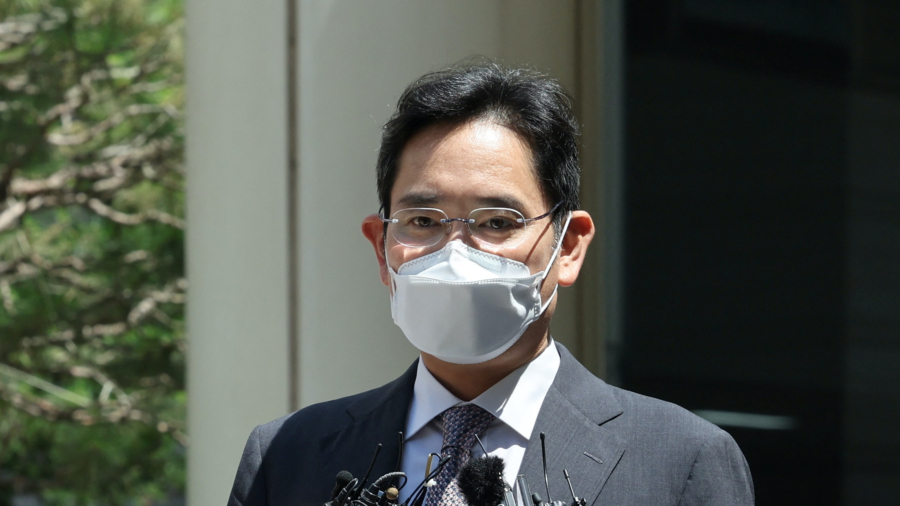SEOUL—South Korea’s President Yoon Suk-yeol pardoned Samsung Electronics Vice Chairman Jay Y. Lee on Friday, with the justice ministry saying the business leader was needed to help overcome a “national economic crisis.”
The pardon is largely symbolic, with Lee already out on parole after serving 18 months in jail for bribery in a scandal that led to massive protests and brought down then-President Park Geun-hye in 2017.
However, analysts said the pardon should mean Lee will be able to carry out business activities with fewer legal restrictions, and could herald some large investments from Samsung, the world’s biggest smartphone and memory-chip maker.
“With urgent needs to overcome the national economic crisis, we carefully selected economic leaders who lead the national growth engine through active technology investment and job creation to be pardoned,” Justice Minister Han Dong Hoon told a briefing.
Tech- and export-dependent South Korea, Asia’s fourth-largest economy is grappling with soaring inflation, weakening demand, poor sentiment, and slowing spending.
Lee, an heir of Samsung’s founding family, welcomed the decision and vowed to work hard for the national economy “with continuous investment and job creation.”
Also pardoned by the pro-business Yoon was Lotte Group chairman Shin Dong-bin, who was sentenced to a two-and-a-half-year prison sentence on charges of bribery, also related to Park.
In a statement, Lotte said Shin would also help in “overcoming the complex global crisis.”
Political Crimes
Park herself was pardoned late last year by her successor, liberal president Moon Jae-in, who struggled to follow through on campaign vows to clean up business and politics.
A survey conducted last month jointly by four pollsters showed that 77 percent of respondents favored pardoning the Samsung leader, despite the earlier protests.
“[That support] is apparently due to the current economic situation, but people also seem to have thought in part that Lee was somewhat in a position where he could not shrug off pressure from the former administration,” said Eom Kyeong-young, a political commentator based in Seoul.
While business groups including the Korea Chamber of Commerce & Industry and Korea Enterprises Federation welcomed the pardon for Lee, some civil rights groups criticized Yoon’s pardons for businessmen.
Another jailed former president, Lee Myung-bak, had been expected to be pardoned after Yoon raised the possibility in June, but was ultimately not on the list. He was arrested in 2018 and sentenced to 17 years in prison for corruption, embezzlement, and bribery.
Back in Business
Analysts have long expected decisions on major projects and investments once Lee was reinstated.
“This removes the employment restriction Lee was technically under,” said Park Ju-gun, head of research firm Leaders Index.
“And projects that were being pursued by Samsung, such as major M&A or investments, these could be tied to the pardon.”
Even before receiving the presidential pardon, Lee had returned to the limelight, appearing in May with President Yoon and U.S. President Joe Biden when they visited Samsung’s Pyeongtaek chip production facilities.
He has also visited Europe in June to meet ASML Holding NV CEO Peter Wennink, discussing the adoption of key high-end chip equipment.
Last November, Samsung decided on Taylor, Texas, as the site of a new $17 billion chip plant.
Top Samsung executives have hinted earlier this year at potential upcoming acquisition activity. Samsung Electronics has not conducted a high-profile deal since it completed its purchase of audio electronics maker Harman for $8 billion in 2017.
Although macroeconomic factors such as a demand downturn may weigh on investment decisions, Samsung has a huge war chest.
Samsung Electronics’ cash balance increased slightly to 125 trillion won ($95.13 billion) as of end-June, from 111 trillion a year earlier.
While experts say Lee could now more freely participate in management, his legal woes persist due to an ongoing trial where he faces the risk of returning to jail if found guilty of charges of fraud and stock manipulation.
By Joyce Lee, Soo-hyang Choi, and Heekyong Yang

